Comprehensive Analysis of Virgin Atlantic's Business Environment
VerifiedAdded on 2020/02/05
|14
|4542
|142
Report
AI Summary
This report provides a detailed analysis of the business environment impacting Virgin Atlantic. It begins by identifying different organizational types and their purposes, followed by an examination of stakeholders and their objectives. The report then explores Virgin Atlantic's responsibilities, including corporate social responsibility, environmental impact, and legal compliance. It delves into various economic systems and their resource allocation, and analyzes the effects of fiscal and monetary policies on Virgin Atlantic's operations. The report also examines the impact of competition policy, market structures, and market forces on the airline's pricing, output decisions, and overall behavior. Finally, it assesses the importance of international trade, global factors, and EU policies on UK business organizations like Virgin Atlantic, concluding with a comprehensive overview of the airline's business environment.
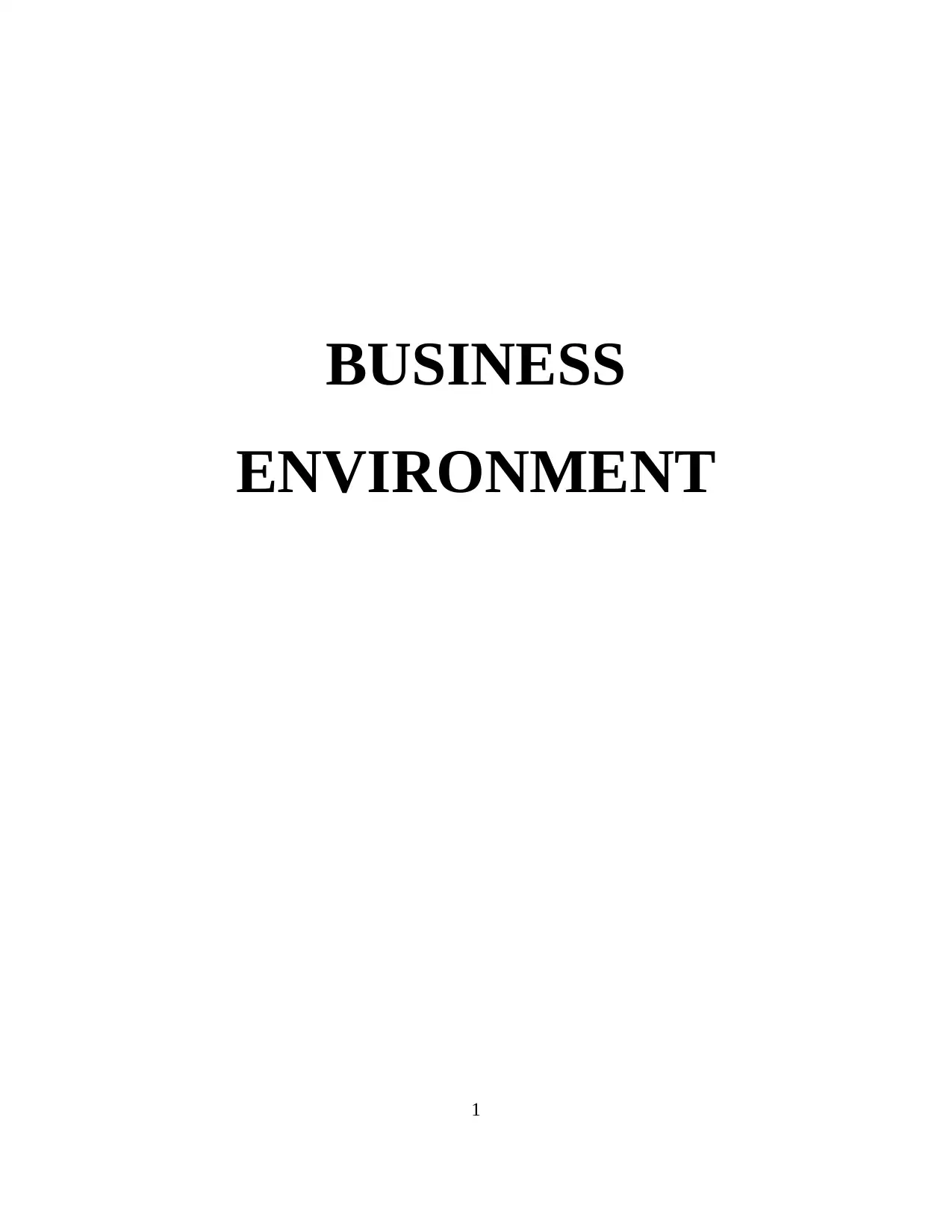
BUSINESS
ENVIRONMENT
1
ENVIRONMENT
1
Paraphrase This Document
Need a fresh take? Get an instant paraphrase of this document with our AI Paraphraser
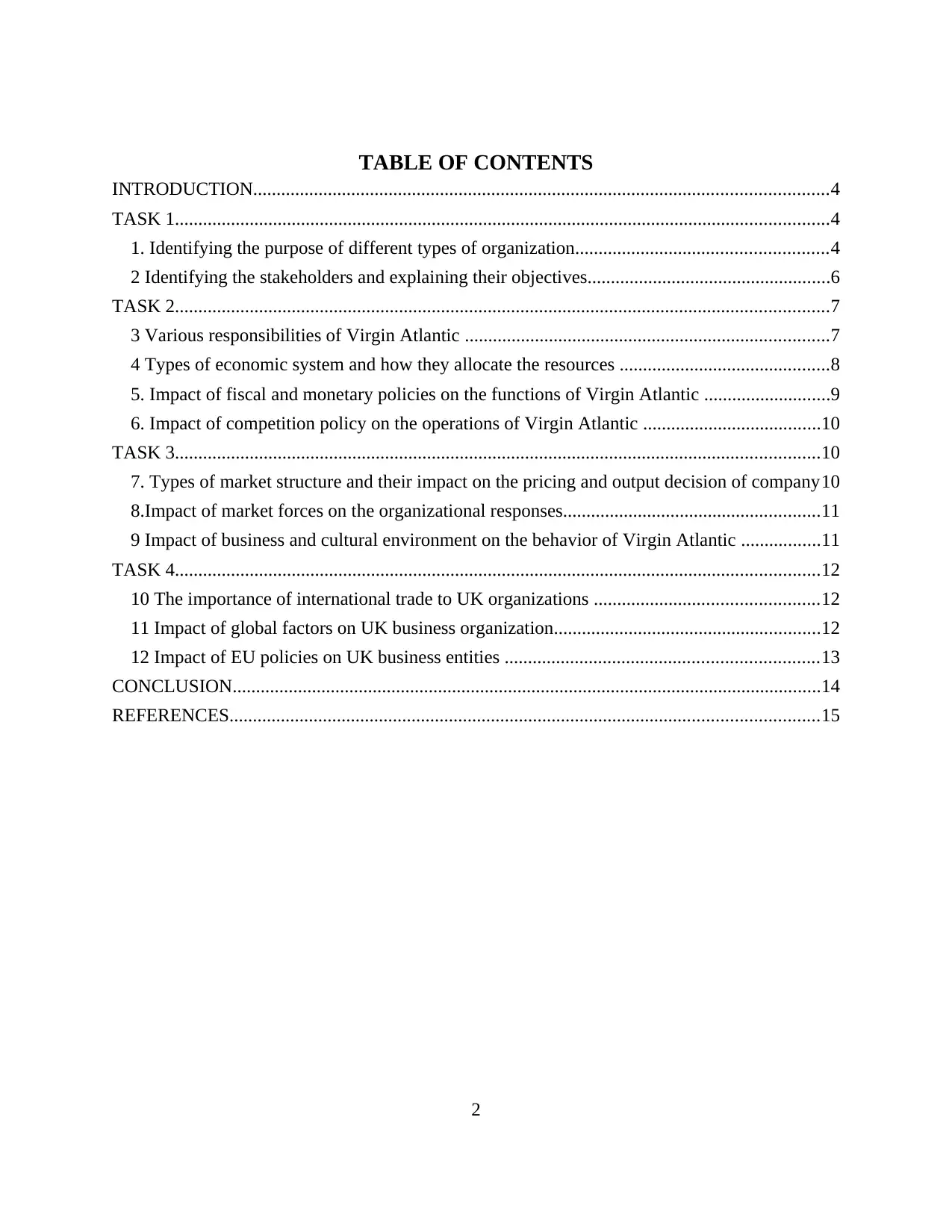
TABLE OF CONTENTS
INTRODUCTION...........................................................................................................................4
TASK 1............................................................................................................................................4
1. Identifying the purpose of different types of organization......................................................4
2 Identifying the stakeholders and explaining their objectives....................................................6
TASK 2............................................................................................................................................7
3 Various responsibilities of Virgin Atlantic ..............................................................................7
4 Types of economic system and how they allocate the resources .............................................8
5. Impact of fiscal and monetary policies on the functions of Virgin Atlantic ...........................9
6. Impact of competition policy on the operations of Virgin Atlantic ......................................10
TASK 3..........................................................................................................................................10
7. Types of market structure and their impact on the pricing and output decision of company10
8.Impact of market forces on the organizational responses.......................................................11
9 Impact of business and cultural environment on the behavior of Virgin Atlantic .................11
TASK 4..........................................................................................................................................12
10 The importance of international trade to UK organizations ................................................12
11 Impact of global factors on UK business organization.........................................................12
12 Impact of EU policies on UK business entities ...................................................................13
CONCLUSION..............................................................................................................................14
REFERENCES..............................................................................................................................15
2
INTRODUCTION...........................................................................................................................4
TASK 1............................................................................................................................................4
1. Identifying the purpose of different types of organization......................................................4
2 Identifying the stakeholders and explaining their objectives....................................................6
TASK 2............................................................................................................................................7
3 Various responsibilities of Virgin Atlantic ..............................................................................7
4 Types of economic system and how they allocate the resources .............................................8
5. Impact of fiscal and monetary policies on the functions of Virgin Atlantic ...........................9
6. Impact of competition policy on the operations of Virgin Atlantic ......................................10
TASK 3..........................................................................................................................................10
7. Types of market structure and their impact on the pricing and output decision of company10
8.Impact of market forces on the organizational responses.......................................................11
9 Impact of business and cultural environment on the behavior of Virgin Atlantic .................11
TASK 4..........................................................................................................................................12
10 The importance of international trade to UK organizations ................................................12
11 Impact of global factors on UK business organization.........................................................12
12 Impact of EU policies on UK business entities ...................................................................13
CONCLUSION..............................................................................................................................14
REFERENCES..............................................................................................................................15
2
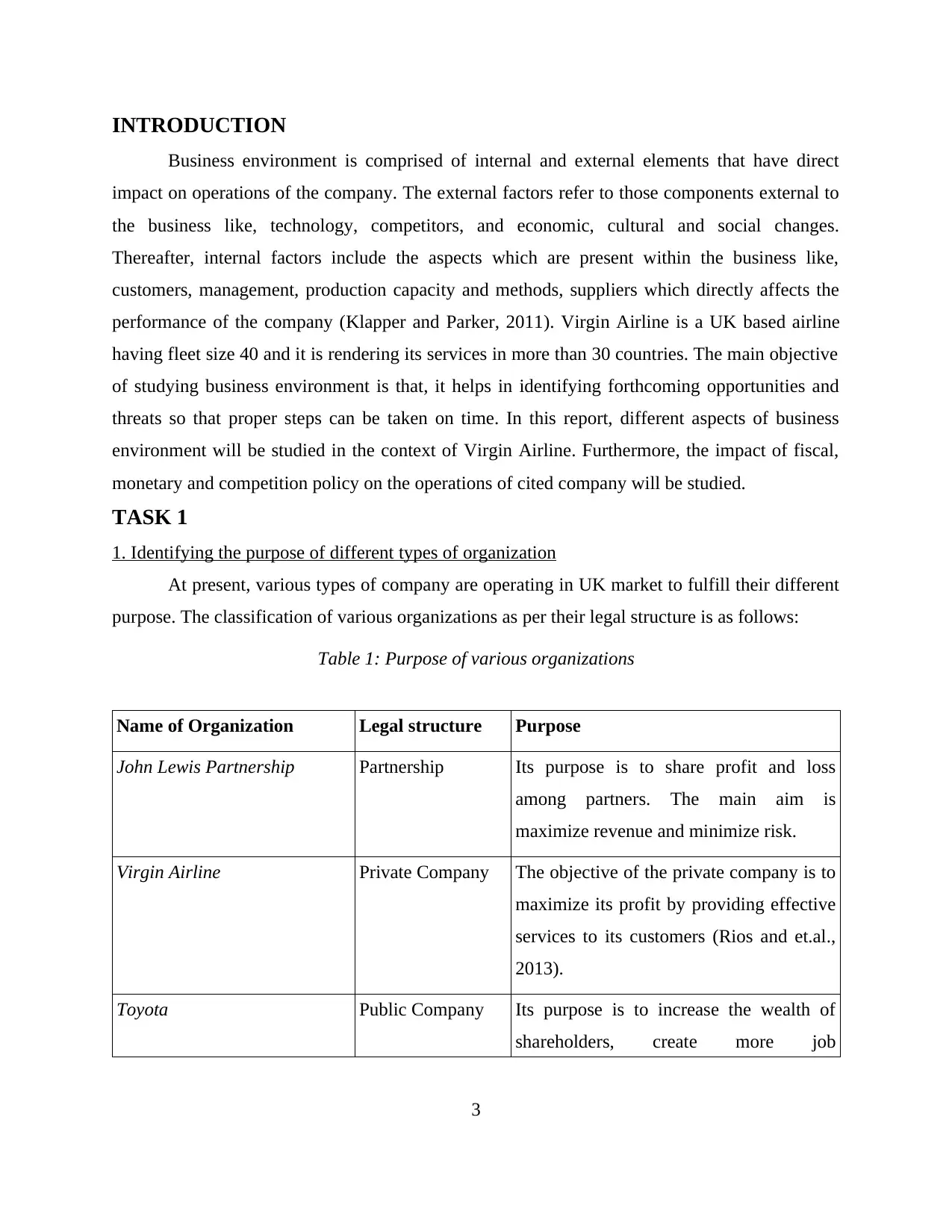
INTRODUCTION
Business environment is comprised of internal and external elements that have direct
impact on operations of the company. The external factors refer to those components external to
the business like, technology, competitors, and economic, cultural and social changes.
Thereafter, internal factors include the aspects which are present within the business like,
customers, management, production capacity and methods, suppliers which directly affects the
performance of the company (Klapper and Parker, 2011). Virgin Airline is a UK based airline
having fleet size 40 and it is rendering its services in more than 30 countries. The main objective
of studying business environment is that, it helps in identifying forthcoming opportunities and
threats so that proper steps can be taken on time. In this report, different aspects of business
environment will be studied in the context of Virgin Airline. Furthermore, the impact of fiscal,
monetary and competition policy on the operations of cited company will be studied.
TASK 1
1. Identifying the purpose of different types of organization
At present, various types of company are operating in UK market to fulfill their different
purpose. The classification of various organizations as per their legal structure is as follows:
Table 1: Purpose of various organizations
Name of Organization Legal structure Purpose
John Lewis Partnership Partnership Its purpose is to share profit and loss
among partners. The main aim is
maximize revenue and minimize risk.
Virgin Airline Private Company The objective of the private company is to
maximize its profit by providing effective
services to its customers (Rios and et.al.,
2013).
Toyota Public Company Its purpose is to increase the wealth of
shareholders, create more job
3
Business environment is comprised of internal and external elements that have direct
impact on operations of the company. The external factors refer to those components external to
the business like, technology, competitors, and economic, cultural and social changes.
Thereafter, internal factors include the aspects which are present within the business like,
customers, management, production capacity and methods, suppliers which directly affects the
performance of the company (Klapper and Parker, 2011). Virgin Airline is a UK based airline
having fleet size 40 and it is rendering its services in more than 30 countries. The main objective
of studying business environment is that, it helps in identifying forthcoming opportunities and
threats so that proper steps can be taken on time. In this report, different aspects of business
environment will be studied in the context of Virgin Airline. Furthermore, the impact of fiscal,
monetary and competition policy on the operations of cited company will be studied.
TASK 1
1. Identifying the purpose of different types of organization
At present, various types of company are operating in UK market to fulfill their different
purpose. The classification of various organizations as per their legal structure is as follows:
Table 1: Purpose of various organizations
Name of Organization Legal structure Purpose
John Lewis Partnership Partnership Its purpose is to share profit and loss
among partners. The main aim is
maximize revenue and minimize risk.
Virgin Airline Private Company The objective of the private company is to
maximize its profit by providing effective
services to its customers (Rios and et.al.,
2013).
Toyota Public Company Its purpose is to increase the wealth of
shareholders, create more job
3
⊘ This is a preview!⊘
Do you want full access?
Subscribe today to unlock all pages.

Trusted by 1+ million students worldwide
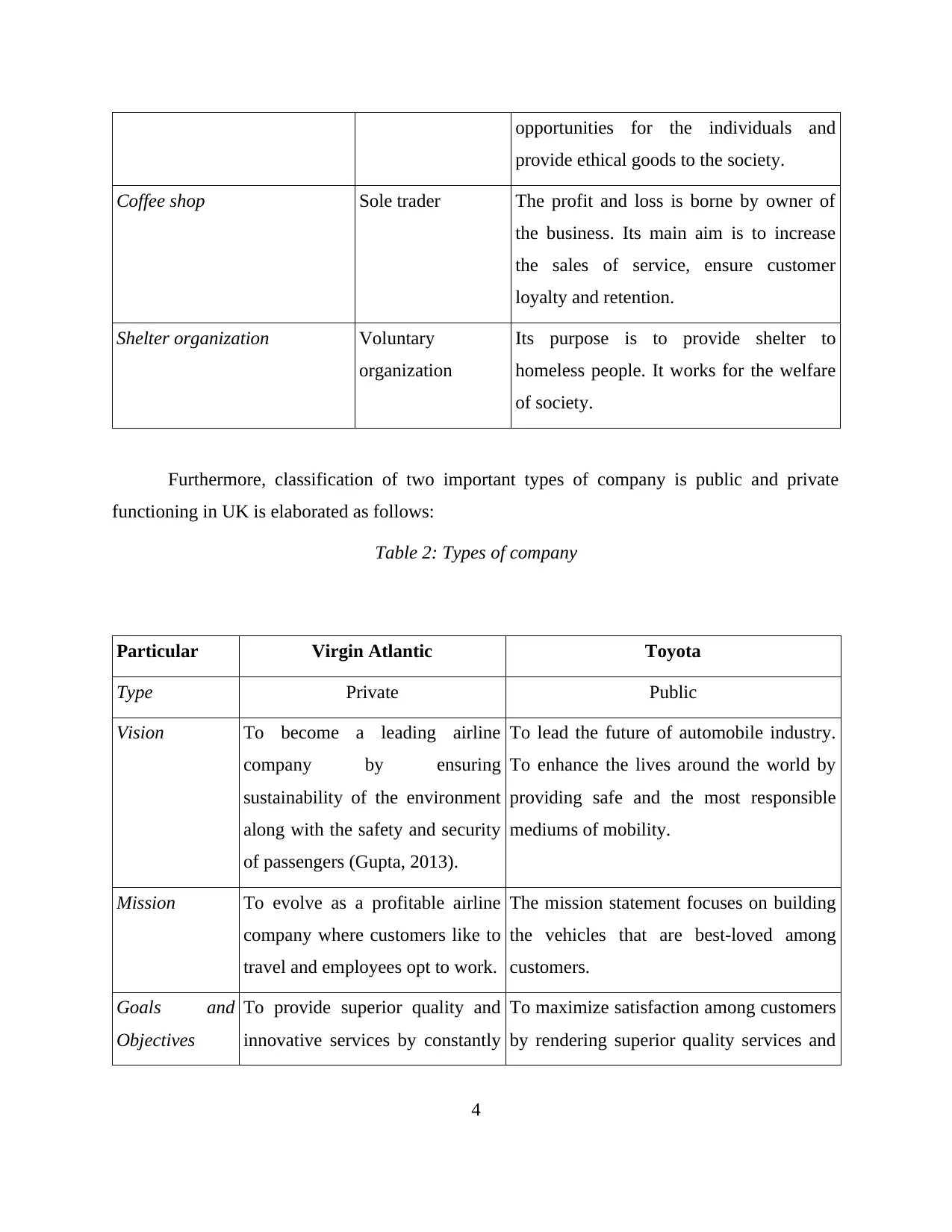
opportunities for the individuals and
provide ethical goods to the society.
Coffee shop Sole trader The profit and loss is borne by owner of
the business. Its main aim is to increase
the sales of service, ensure customer
loyalty and retention.
Shelter organization Voluntary
organization
Its purpose is to provide shelter to
homeless people. It works for the welfare
of society.
Furthermore, classification of two important types of company is public and private
functioning in UK is elaborated as follows:
Table 2: Types of company
Particular Virgin Atlantic Toyota
Type Private Public
Vision To become a leading airline
company by ensuring
sustainability of the environment
along with the safety and security
of passengers (Gupta, 2013).
To lead the future of automobile industry.
To enhance the lives around the world by
providing safe and the most responsible
mediums of mobility.
Mission To evolve as a profitable airline
company where customers like to
travel and employees opt to work.
The mission statement focuses on building
the vehicles that are best-loved among
customers.
Goals and
Objectives
To provide superior quality and
innovative services by constantly
To maximize satisfaction among customers
by rendering superior quality services and
4
provide ethical goods to the society.
Coffee shop Sole trader The profit and loss is borne by owner of
the business. Its main aim is to increase
the sales of service, ensure customer
loyalty and retention.
Shelter organization Voluntary
organization
Its purpose is to provide shelter to
homeless people. It works for the welfare
of society.
Furthermore, classification of two important types of company is public and private
functioning in UK is elaborated as follows:
Table 2: Types of company
Particular Virgin Atlantic Toyota
Type Private Public
Vision To become a leading airline
company by ensuring
sustainability of the environment
along with the safety and security
of passengers (Gupta, 2013).
To lead the future of automobile industry.
To enhance the lives around the world by
providing safe and the most responsible
mediums of mobility.
Mission To evolve as a profitable airline
company where customers like to
travel and employees opt to work.
The mission statement focuses on building
the vehicles that are best-loved among
customers.
Goals and
Objectives
To provide superior quality and
innovative services by constantly
To maximize satisfaction among customers
by rendering superior quality services and
4
Paraphrase This Document
Need a fresh take? Get an instant paraphrase of this document with our AI Paraphraser
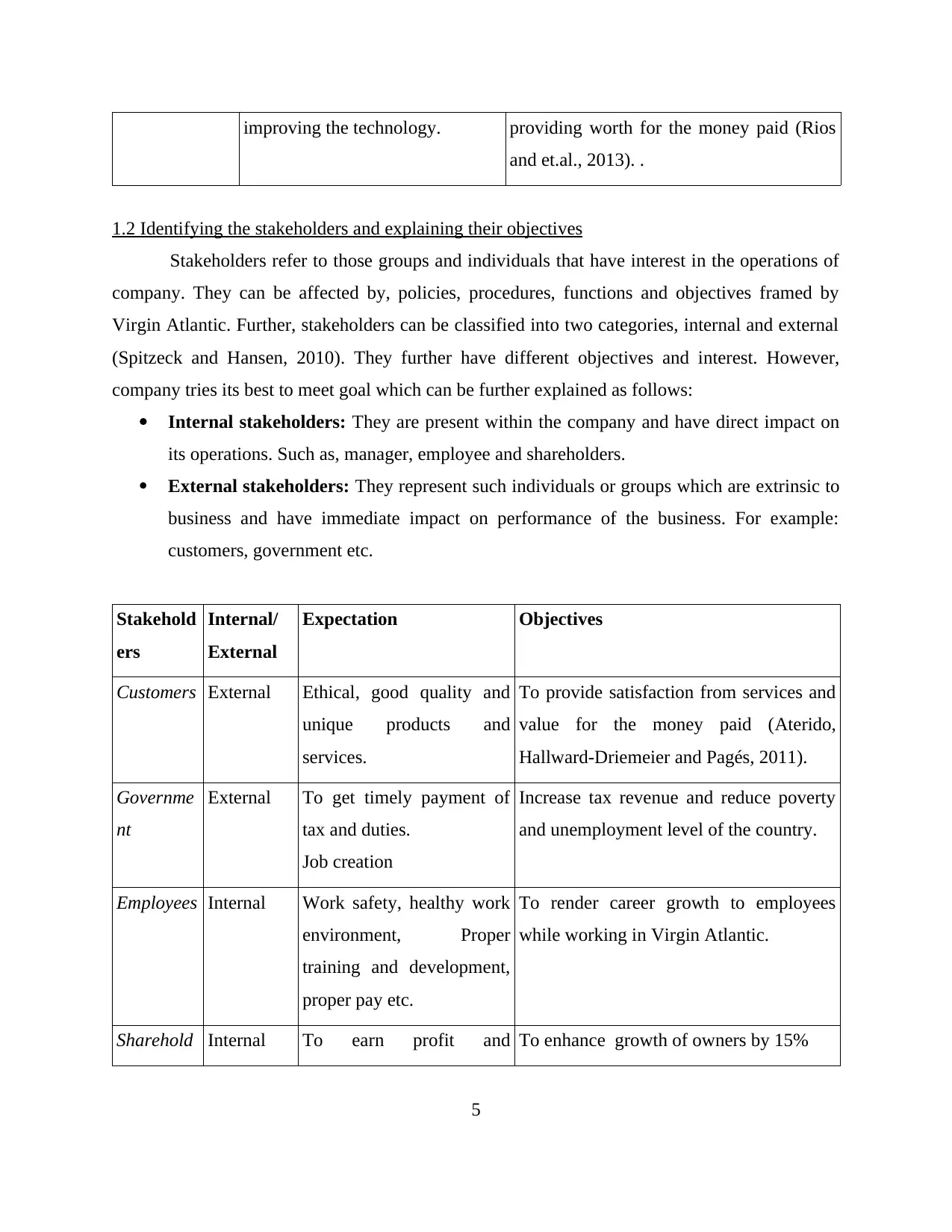
improving the technology. providing worth for the money paid (Rios
and et.al., 2013). .
1.2 Identifying the stakeholders and explaining their objectives
Stakeholders refer to those groups and individuals that have interest in the operations of
company. They can be affected by, policies, procedures, functions and objectives framed by
Virgin Atlantic. Further, stakeholders can be classified into two categories, internal and external
(Spitzeck and Hansen, 2010). They further have different objectives and interest. However,
company tries its best to meet goal which can be further explained as follows:
Internal stakeholders: They are present within the company and have direct impact on
its operations. Such as, manager, employee and shareholders.
External stakeholders: They represent such individuals or groups which are extrinsic to
business and have immediate impact on performance of the business. For example:
customers, government etc.
Stakehold
ers
Internal/
External
Expectation Objectives
Customers External Ethical, good quality and
unique products and
services.
To provide satisfaction from services and
value for the money paid (Aterido,
Hallward-Driemeier and Pagés, 2011).
Governme
nt
External To get timely payment of
tax and duties.
Job creation
Increase tax revenue and reduce poverty
and unemployment level of the country.
Employees Internal Work safety, healthy work
environment, Proper
training and development,
proper pay etc.
To render career growth to employees
while working in Virgin Atlantic.
Sharehold Internal To earn profit and To enhance growth of owners by 15%
5
and et.al., 2013). .
1.2 Identifying the stakeholders and explaining their objectives
Stakeholders refer to those groups and individuals that have interest in the operations of
company. They can be affected by, policies, procedures, functions and objectives framed by
Virgin Atlantic. Further, stakeholders can be classified into two categories, internal and external
(Spitzeck and Hansen, 2010). They further have different objectives and interest. However,
company tries its best to meet goal which can be further explained as follows:
Internal stakeholders: They are present within the company and have direct impact on
its operations. Such as, manager, employee and shareholders.
External stakeholders: They represent such individuals or groups which are extrinsic to
business and have immediate impact on performance of the business. For example:
customers, government etc.
Stakehold
ers
Internal/
External
Expectation Objectives
Customers External Ethical, good quality and
unique products and
services.
To provide satisfaction from services and
value for the money paid (Aterido,
Hallward-Driemeier and Pagés, 2011).
Governme
nt
External To get timely payment of
tax and duties.
Job creation
Increase tax revenue and reduce poverty
and unemployment level of the country.
Employees Internal Work safety, healthy work
environment, Proper
training and development,
proper pay etc.
To render career growth to employees
while working in Virgin Atlantic.
Sharehold Internal To earn profit and To enhance growth of owners by 15%
5
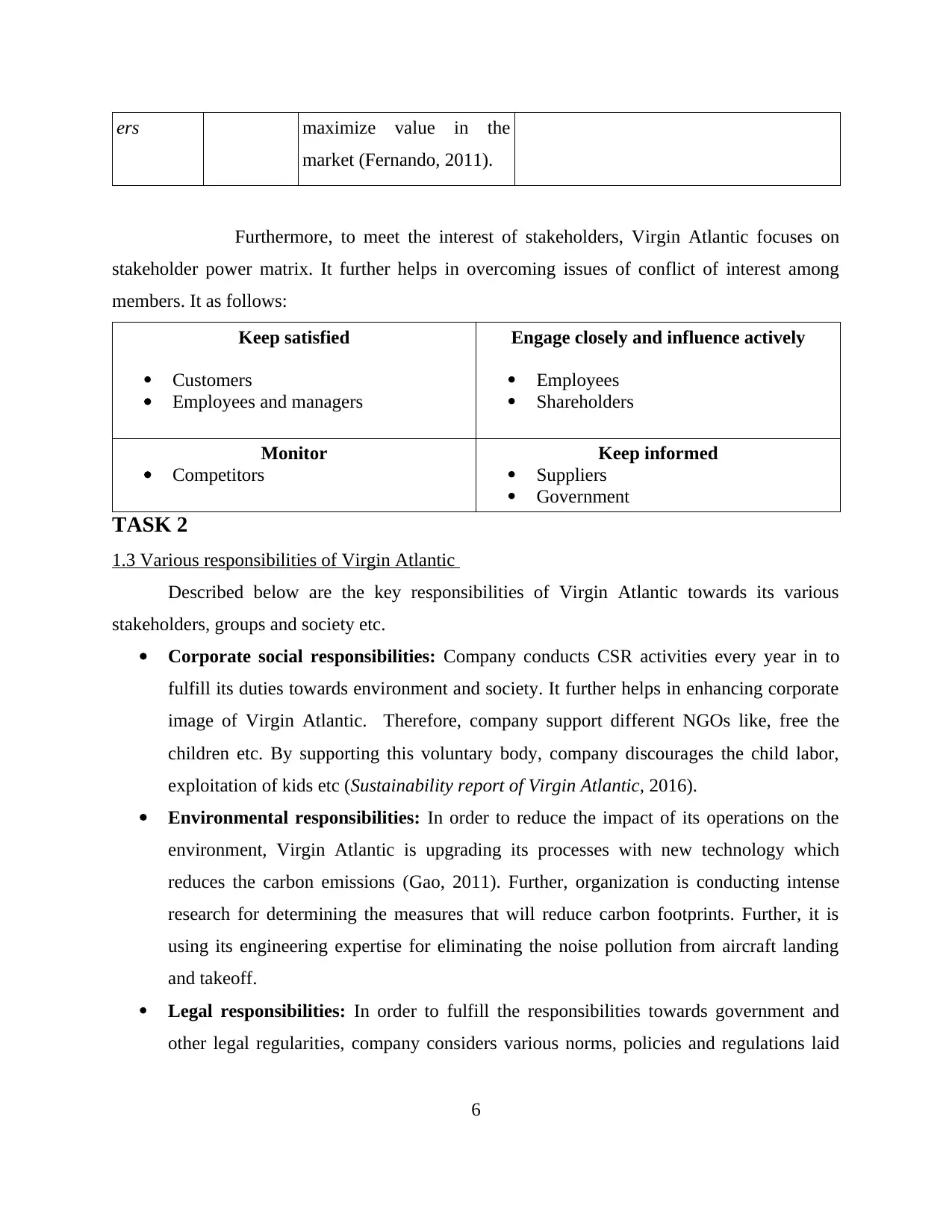
ers maximize value in the
market (Fernando, 2011).
Furthermore, to meet the interest of stakeholders, Virgin Atlantic focuses on
stakeholder power matrix. It further helps in overcoming issues of conflict of interest among
members. It as follows:
Keep satisfied
Customers
Employees and managers
Engage closely and influence actively
Employees
Shareholders
Monitor
Competitors
Keep informed
Suppliers
Government
TASK 2
1.3 Various responsibilities of Virgin Atlantic
Described below are the key responsibilities of Virgin Atlantic towards its various
stakeholders, groups and society etc.
Corporate social responsibilities: Company conducts CSR activities every year in to
fulfill its duties towards environment and society. It further helps in enhancing corporate
image of Virgin Atlantic. Therefore, company support different NGOs like, free the
children etc. By supporting this voluntary body, company discourages the child labor,
exploitation of kids etc (Sustainability report of Virgin Atlantic, 2016).
Environmental responsibilities: In order to reduce the impact of its operations on the
environment, Virgin Atlantic is upgrading its processes with new technology which
reduces the carbon emissions (Gao, 2011). Further, organization is conducting intense
research for determining the measures that will reduce carbon footprints. Further, it is
using its engineering expertise for eliminating the noise pollution from aircraft landing
and takeoff.
Legal responsibilities: In order to fulfill the responsibilities towards government and
other legal regularities, company considers various norms, policies and regulations laid
6
market (Fernando, 2011).
Furthermore, to meet the interest of stakeholders, Virgin Atlantic focuses on
stakeholder power matrix. It further helps in overcoming issues of conflict of interest among
members. It as follows:
Keep satisfied
Customers
Employees and managers
Engage closely and influence actively
Employees
Shareholders
Monitor
Competitors
Keep informed
Suppliers
Government
TASK 2
1.3 Various responsibilities of Virgin Atlantic
Described below are the key responsibilities of Virgin Atlantic towards its various
stakeholders, groups and society etc.
Corporate social responsibilities: Company conducts CSR activities every year in to
fulfill its duties towards environment and society. It further helps in enhancing corporate
image of Virgin Atlantic. Therefore, company support different NGOs like, free the
children etc. By supporting this voluntary body, company discourages the child labor,
exploitation of kids etc (Sustainability report of Virgin Atlantic, 2016).
Environmental responsibilities: In order to reduce the impact of its operations on the
environment, Virgin Atlantic is upgrading its processes with new technology which
reduces the carbon emissions (Gao, 2011). Further, organization is conducting intense
research for determining the measures that will reduce carbon footprints. Further, it is
using its engineering expertise for eliminating the noise pollution from aircraft landing
and takeoff.
Legal responsibilities: In order to fulfill the responsibilities towards government and
other legal regularities, company considers various norms, policies and regulations laid
6
⊘ This is a preview!⊘
Do you want full access?
Subscribe today to unlock all pages.

Trusted by 1+ million students worldwide
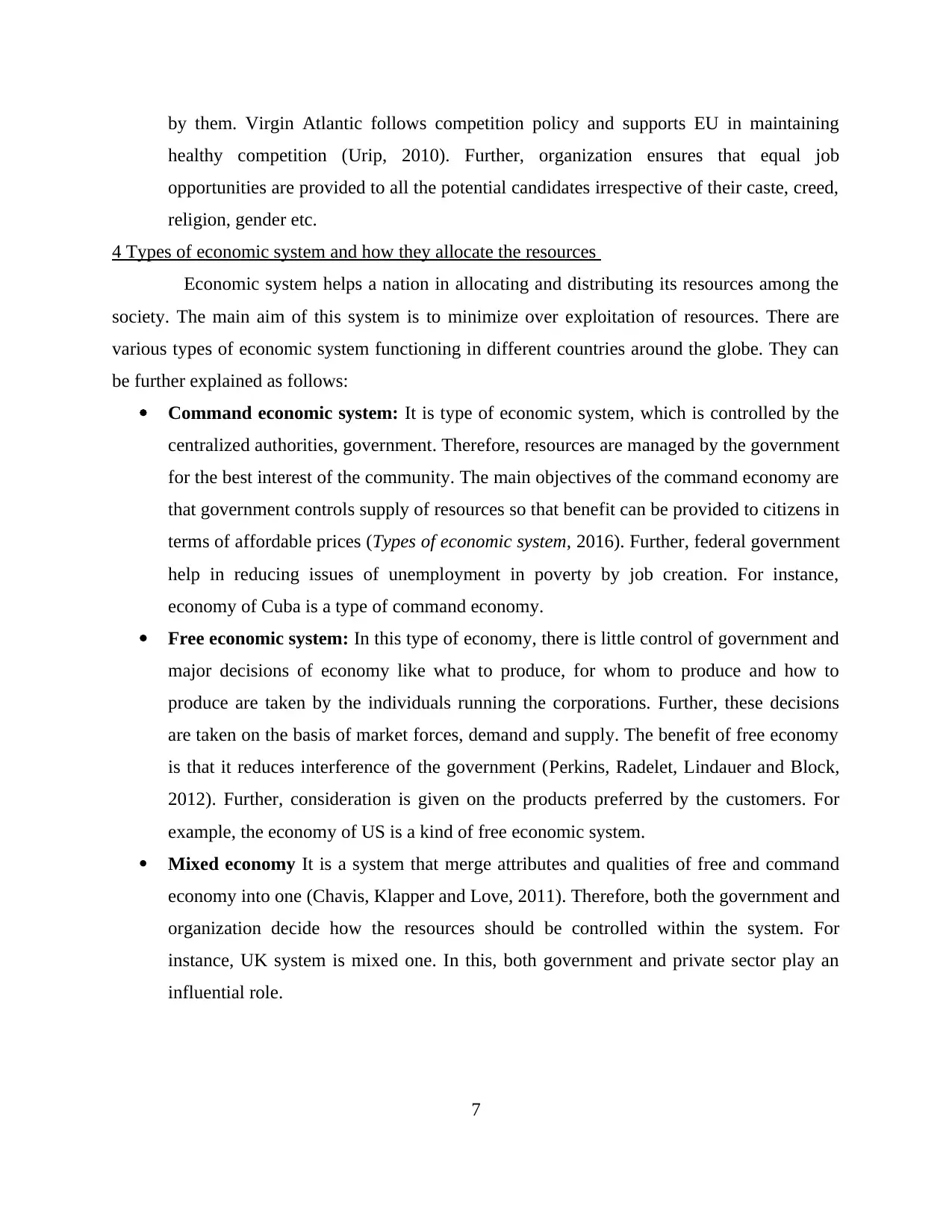
by them. Virgin Atlantic follows competition policy and supports EU in maintaining
healthy competition (Urip, 2010). Further, organization ensures that equal job
opportunities are provided to all the potential candidates irrespective of their caste, creed,
religion, gender etc.
4 Types of economic system and how they allocate the resources
Economic system helps a nation in allocating and distributing its resources among the
society. The main aim of this system is to minimize over exploitation of resources. There are
various types of economic system functioning in different countries around the globe. They can
be further explained as follows:
Command economic system: It is type of economic system, which is controlled by the
centralized authorities, government. Therefore, resources are managed by the government
for the best interest of the community. The main objectives of the command economy are
that government controls supply of resources so that benefit can be provided to citizens in
terms of affordable prices (Types of economic system, 2016). Further, federal government
help in reducing issues of unemployment in poverty by job creation. For instance,
economy of Cuba is a type of command economy.
Free economic system: In this type of economy, there is little control of government and
major decisions of economy like what to produce, for whom to produce and how to
produce are taken by the individuals running the corporations. Further, these decisions
are taken on the basis of market forces, demand and supply. The benefit of free economy
is that it reduces interference of the government (Perkins, Radelet, Lindauer and Block,
2012). Further, consideration is given on the products preferred by the customers. For
example, the economy of US is a kind of free economic system.
Mixed economy It is a system that merge attributes and qualities of free and command
economy into one (Chavis, Klapper and Love, 2011). Therefore, both the government and
organization decide how the resources should be controlled within the system. For
instance, UK system is mixed one. In this, both government and private sector play an
influential role.
7
healthy competition (Urip, 2010). Further, organization ensures that equal job
opportunities are provided to all the potential candidates irrespective of their caste, creed,
religion, gender etc.
4 Types of economic system and how they allocate the resources
Economic system helps a nation in allocating and distributing its resources among the
society. The main aim of this system is to minimize over exploitation of resources. There are
various types of economic system functioning in different countries around the globe. They can
be further explained as follows:
Command economic system: It is type of economic system, which is controlled by the
centralized authorities, government. Therefore, resources are managed by the government
for the best interest of the community. The main objectives of the command economy are
that government controls supply of resources so that benefit can be provided to citizens in
terms of affordable prices (Types of economic system, 2016). Further, federal government
help in reducing issues of unemployment in poverty by job creation. For instance,
economy of Cuba is a type of command economy.
Free economic system: In this type of economy, there is little control of government and
major decisions of economy like what to produce, for whom to produce and how to
produce are taken by the individuals running the corporations. Further, these decisions
are taken on the basis of market forces, demand and supply. The benefit of free economy
is that it reduces interference of the government (Perkins, Radelet, Lindauer and Block,
2012). Further, consideration is given on the products preferred by the customers. For
example, the economy of US is a kind of free economic system.
Mixed economy It is a system that merge attributes and qualities of free and command
economy into one (Chavis, Klapper and Love, 2011). Therefore, both the government and
organization decide how the resources should be controlled within the system. For
instance, UK system is mixed one. In this, both government and private sector play an
influential role.
7
Paraphrase This Document
Need a fresh take? Get an instant paraphrase of this document with our AI Paraphraser
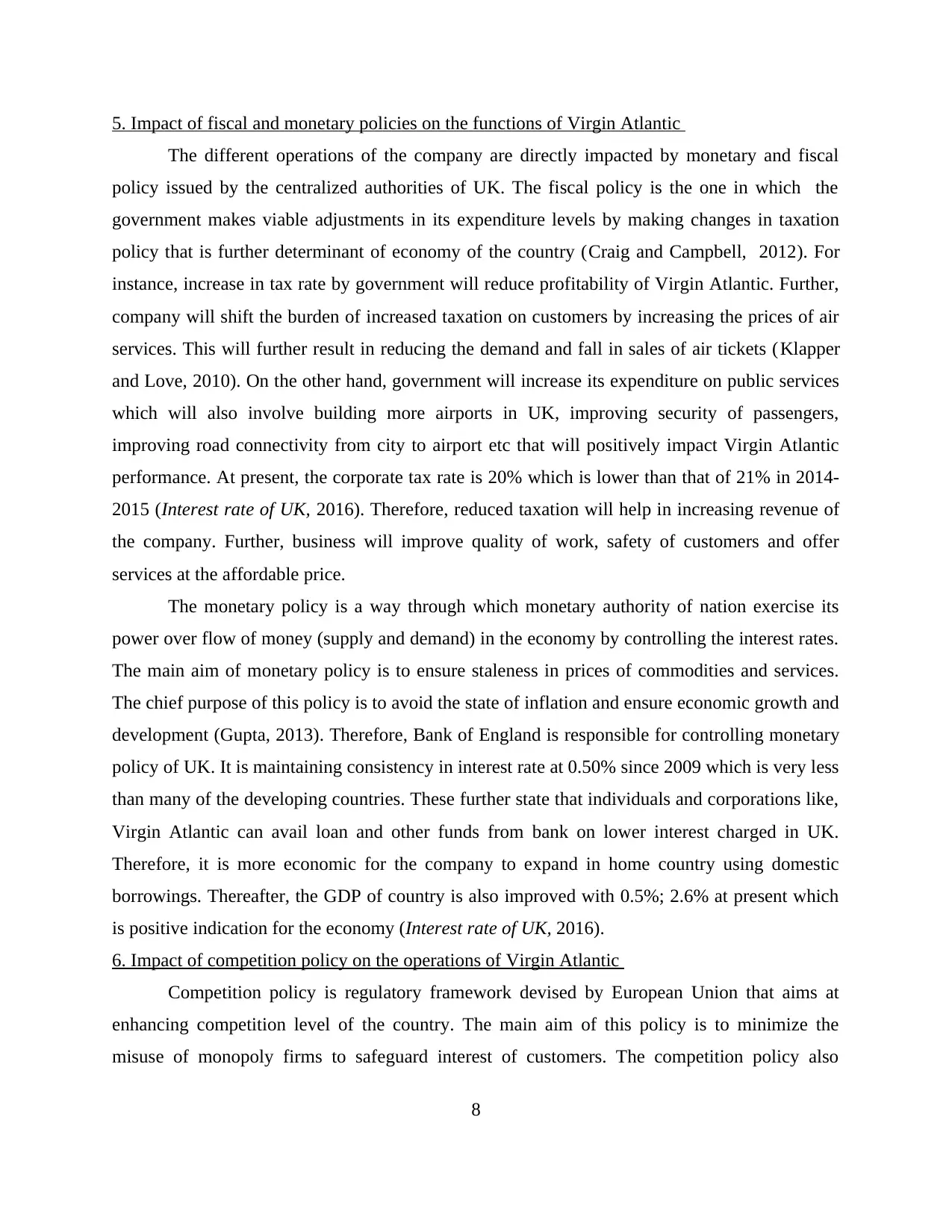
5. Impact of fiscal and monetary policies on the functions of Virgin Atlantic
The different operations of the company are directly impacted by monetary and fiscal
policy issued by the centralized authorities of UK. The fiscal policy is the one in which the
government makes viable adjustments in its expenditure levels by making changes in taxation
policy that is further determinant of economy of the country (Craig and Campbell, 2012). For
instance, increase in tax rate by government will reduce profitability of Virgin Atlantic. Further,
company will shift the burden of increased taxation on customers by increasing the prices of air
services. This will further result in reducing the demand and fall in sales of air tickets (Klapper
and Love, 2010). On the other hand, government will increase its expenditure on public services
which will also involve building more airports in UK, improving security of passengers,
improving road connectivity from city to airport etc that will positively impact Virgin Atlantic
performance. At present, the corporate tax rate is 20% which is lower than that of 21% in 2014-
2015 (Interest rate of UK, 2016). Therefore, reduced taxation will help in increasing revenue of
the company. Further, business will improve quality of work, safety of customers and offer
services at the affordable price.
The monetary policy is a way through which monetary authority of nation exercise its
power over flow of money (supply and demand) in the economy by controlling the interest rates.
The main aim of monetary policy is to ensure staleness in prices of commodities and services.
The chief purpose of this policy is to avoid the state of inflation and ensure economic growth and
development (Gupta, 2013). Therefore, Bank of England is responsible for controlling monetary
policy of UK. It is maintaining consistency in interest rate at 0.50% since 2009 which is very less
than many of the developing countries. These further state that individuals and corporations like,
Virgin Atlantic can avail loan and other funds from bank on lower interest charged in UK.
Therefore, it is more economic for the company to expand in home country using domestic
borrowings. Thereafter, the GDP of country is also improved with 0.5%; 2.6% at present which
is positive indication for the economy (Interest rate of UK, 2016).
6. Impact of competition policy on the operations of Virgin Atlantic
Competition policy is regulatory framework devised by European Union that aims at
enhancing competition level of the country. The main aim of this policy is to minimize the
misuse of monopoly firms to safeguard interest of customers. The competition policy also
8
The different operations of the company are directly impacted by monetary and fiscal
policy issued by the centralized authorities of UK. The fiscal policy is the one in which the
government makes viable adjustments in its expenditure levels by making changes in taxation
policy that is further determinant of economy of the country (Craig and Campbell, 2012). For
instance, increase in tax rate by government will reduce profitability of Virgin Atlantic. Further,
company will shift the burden of increased taxation on customers by increasing the prices of air
services. This will further result in reducing the demand and fall in sales of air tickets (Klapper
and Love, 2010). On the other hand, government will increase its expenditure on public services
which will also involve building more airports in UK, improving security of passengers,
improving road connectivity from city to airport etc that will positively impact Virgin Atlantic
performance. At present, the corporate tax rate is 20% which is lower than that of 21% in 2014-
2015 (Interest rate of UK, 2016). Therefore, reduced taxation will help in increasing revenue of
the company. Further, business will improve quality of work, safety of customers and offer
services at the affordable price.
The monetary policy is a way through which monetary authority of nation exercise its
power over flow of money (supply and demand) in the economy by controlling the interest rates.
The main aim of monetary policy is to ensure staleness in prices of commodities and services.
The chief purpose of this policy is to avoid the state of inflation and ensure economic growth and
development (Gupta, 2013). Therefore, Bank of England is responsible for controlling monetary
policy of UK. It is maintaining consistency in interest rate at 0.50% since 2009 which is very less
than many of the developing countries. These further state that individuals and corporations like,
Virgin Atlantic can avail loan and other funds from bank on lower interest charged in UK.
Therefore, it is more economic for the company to expand in home country using domestic
borrowings. Thereafter, the GDP of country is also improved with 0.5%; 2.6% at present which
is positive indication for the economy (Interest rate of UK, 2016).
6. Impact of competition policy on the operations of Virgin Atlantic
Competition policy is regulatory framework devised by European Union that aims at
enhancing competition level of the country. The main aim of this policy is to minimize the
misuse of monopoly firms to safeguard interest of customers. The competition policy also
8
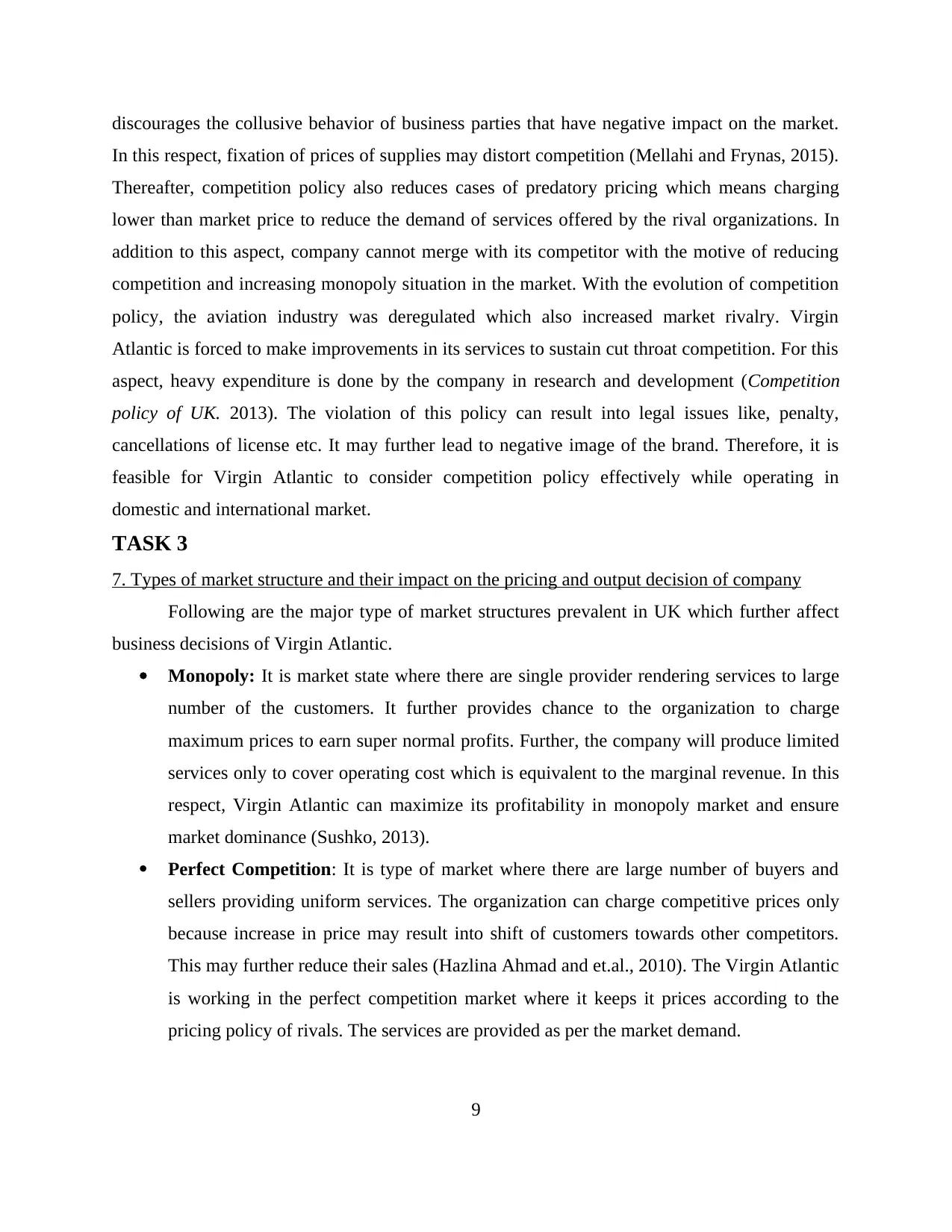
discourages the collusive behavior of business parties that have negative impact on the market.
In this respect, fixation of prices of supplies may distort competition (Mellahi and Frynas, 2015).
Thereafter, competition policy also reduces cases of predatory pricing which means charging
lower than market price to reduce the demand of services offered by the rival organizations. In
addition to this aspect, company cannot merge with its competitor with the motive of reducing
competition and increasing monopoly situation in the market. With the evolution of competition
policy, the aviation industry was deregulated which also increased market rivalry. Virgin
Atlantic is forced to make improvements in its services to sustain cut throat competition. For this
aspect, heavy expenditure is done by the company in research and development (Competition
policy of UK. 2013). The violation of this policy can result into legal issues like, penalty,
cancellations of license etc. It may further lead to negative image of the brand. Therefore, it is
feasible for Virgin Atlantic to consider competition policy effectively while operating in
domestic and international market.
TASK 3
7. Types of market structure and their impact on the pricing and output decision of company
Following are the major type of market structures prevalent in UK which further affect
business decisions of Virgin Atlantic.
Monopoly: It is market state where there are single provider rendering services to large
number of the customers. It further provides chance to the organization to charge
maximum prices to earn super normal profits. Further, the company will produce limited
services only to cover operating cost which is equivalent to the marginal revenue. In this
respect, Virgin Atlantic can maximize its profitability in monopoly market and ensure
market dominance (Sushko, 2013).
Perfect Competition: It is type of market where there are large number of buyers and
sellers providing uniform services. The organization can charge competitive prices only
because increase in price may result into shift of customers towards other competitors.
This may further reduce their sales (Hazlina Ahmad and et.al., 2010). The Virgin Atlantic
is working in the perfect competition market where it keeps it prices according to the
pricing policy of rivals. The services are provided as per the market demand.
9
In this respect, fixation of prices of supplies may distort competition (Mellahi and Frynas, 2015).
Thereafter, competition policy also reduces cases of predatory pricing which means charging
lower than market price to reduce the demand of services offered by the rival organizations. In
addition to this aspect, company cannot merge with its competitor with the motive of reducing
competition and increasing monopoly situation in the market. With the evolution of competition
policy, the aviation industry was deregulated which also increased market rivalry. Virgin
Atlantic is forced to make improvements in its services to sustain cut throat competition. For this
aspect, heavy expenditure is done by the company in research and development (Competition
policy of UK. 2013). The violation of this policy can result into legal issues like, penalty,
cancellations of license etc. It may further lead to negative image of the brand. Therefore, it is
feasible for Virgin Atlantic to consider competition policy effectively while operating in
domestic and international market.
TASK 3
7. Types of market structure and their impact on the pricing and output decision of company
Following are the major type of market structures prevalent in UK which further affect
business decisions of Virgin Atlantic.
Monopoly: It is market state where there are single provider rendering services to large
number of the customers. It further provides chance to the organization to charge
maximum prices to earn super normal profits. Further, the company will produce limited
services only to cover operating cost which is equivalent to the marginal revenue. In this
respect, Virgin Atlantic can maximize its profitability in monopoly market and ensure
market dominance (Sushko, 2013).
Perfect Competition: It is type of market where there are large number of buyers and
sellers providing uniform services. The organization can charge competitive prices only
because increase in price may result into shift of customers towards other competitors.
This may further reduce their sales (Hazlina Ahmad and et.al., 2010). The Virgin Atlantic
is working in the perfect competition market where it keeps it prices according to the
pricing policy of rivals. The services are provided as per the market demand.
9
⊘ This is a preview!⊘
Do you want full access?
Subscribe today to unlock all pages.

Trusted by 1+ million students worldwide
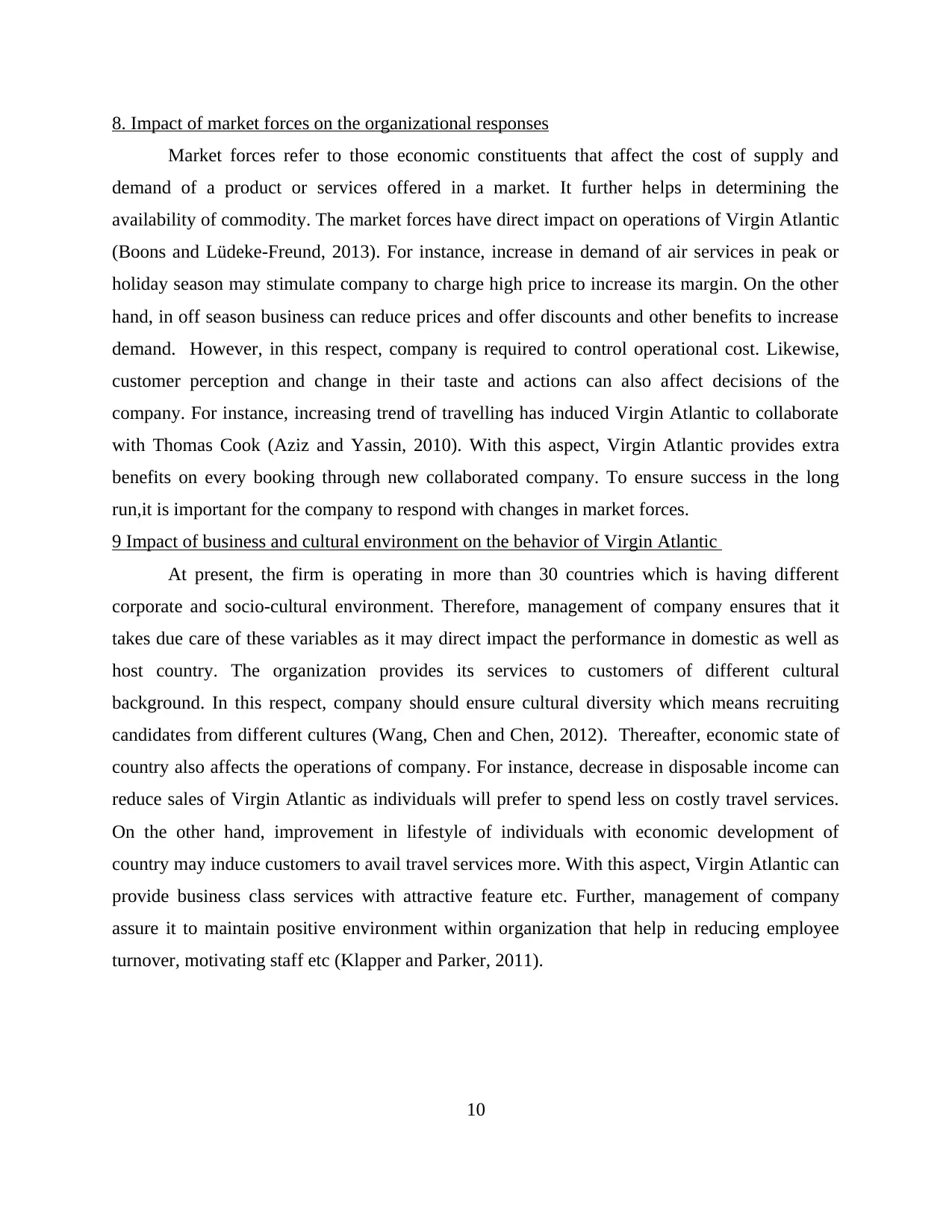
8. Impact of market forces on the organizational responses
Market forces refer to those economic constituents that affect the cost of supply and
demand of a product or services offered in a market. It further helps in determining the
availability of commodity. The market forces have direct impact on operations of Virgin Atlantic
(Boons and Lüdeke-Freund, 2013). For instance, increase in demand of air services in peak or
holiday season may stimulate company to charge high price to increase its margin. On the other
hand, in off season business can reduce prices and offer discounts and other benefits to increase
demand. However, in this respect, company is required to control operational cost. Likewise,
customer perception and change in their taste and actions can also affect decisions of the
company. For instance, increasing trend of travelling has induced Virgin Atlantic to collaborate
with Thomas Cook (Aziz and Yassin, 2010). With this aspect, Virgin Atlantic provides extra
benefits on every booking through new collaborated company. To ensure success in the long
run,it is important for the company to respond with changes in market forces.
9 Impact of business and cultural environment on the behavior of Virgin Atlantic
At present, the firm is operating in more than 30 countries which is having different
corporate and socio-cultural environment. Therefore, management of company ensures that it
takes due care of these variables as it may direct impact the performance in domestic as well as
host country. The organization provides its services to customers of different cultural
background. In this respect, company should ensure cultural diversity which means recruiting
candidates from different cultures (Wang, Chen and Chen, 2012). Thereafter, economic state of
country also affects the operations of company. For instance, decrease in disposable income can
reduce sales of Virgin Atlantic as individuals will prefer to spend less on costly travel services.
On the other hand, improvement in lifestyle of individuals with economic development of
country may induce customers to avail travel services more. With this aspect, Virgin Atlantic can
provide business class services with attractive feature etc. Further, management of company
assure it to maintain positive environment within organization that help in reducing employee
turnover, motivating staff etc (Klapper and Parker, 2011).
10
Market forces refer to those economic constituents that affect the cost of supply and
demand of a product or services offered in a market. It further helps in determining the
availability of commodity. The market forces have direct impact on operations of Virgin Atlantic
(Boons and Lüdeke-Freund, 2013). For instance, increase in demand of air services in peak or
holiday season may stimulate company to charge high price to increase its margin. On the other
hand, in off season business can reduce prices and offer discounts and other benefits to increase
demand. However, in this respect, company is required to control operational cost. Likewise,
customer perception and change in their taste and actions can also affect decisions of the
company. For instance, increasing trend of travelling has induced Virgin Atlantic to collaborate
with Thomas Cook (Aziz and Yassin, 2010). With this aspect, Virgin Atlantic provides extra
benefits on every booking through new collaborated company. To ensure success in the long
run,it is important for the company to respond with changes in market forces.
9 Impact of business and cultural environment on the behavior of Virgin Atlantic
At present, the firm is operating in more than 30 countries which is having different
corporate and socio-cultural environment. Therefore, management of company ensures that it
takes due care of these variables as it may direct impact the performance in domestic as well as
host country. The organization provides its services to customers of different cultural
background. In this respect, company should ensure cultural diversity which means recruiting
candidates from different cultures (Wang, Chen and Chen, 2012). Thereafter, economic state of
country also affects the operations of company. For instance, decrease in disposable income can
reduce sales of Virgin Atlantic as individuals will prefer to spend less on costly travel services.
On the other hand, improvement in lifestyle of individuals with economic development of
country may induce customers to avail travel services more. With this aspect, Virgin Atlantic can
provide business class services with attractive feature etc. Further, management of company
assure it to maintain positive environment within organization that help in reducing employee
turnover, motivating staff etc (Klapper and Parker, 2011).
10
Paraphrase This Document
Need a fresh take? Get an instant paraphrase of this document with our AI Paraphraser
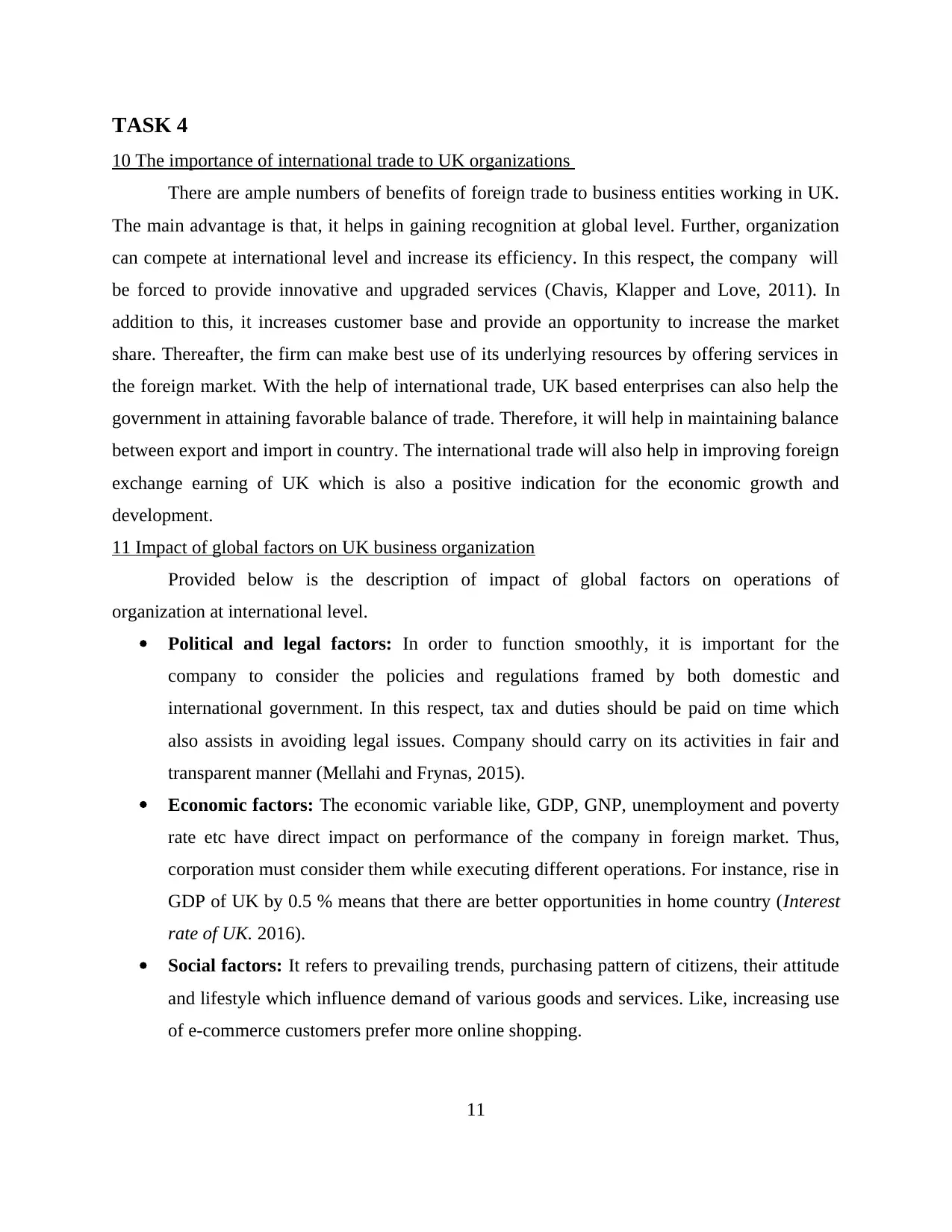
TASK 4
10 The importance of international trade to UK organizations
There are ample numbers of benefits of foreign trade to business entities working in UK.
The main advantage is that, it helps in gaining recognition at global level. Further, organization
can compete at international level and increase its efficiency. In this respect, the company will
be forced to provide innovative and upgraded services (Chavis, Klapper and Love, 2011). In
addition to this, it increases customer base and provide an opportunity to increase the market
share. Thereafter, the firm can make best use of its underlying resources by offering services in
the foreign market. With the help of international trade, UK based enterprises can also help the
government in attaining favorable balance of trade. Therefore, it will help in maintaining balance
between export and import in country. The international trade will also help in improving foreign
exchange earning of UK which is also a positive indication for the economic growth and
development.
11 Impact of global factors on UK business organization
Provided below is the description of impact of global factors on operations of
organization at international level.
Political and legal factors: In order to function smoothly, it is important for the
company to consider the policies and regulations framed by both domestic and
international government. In this respect, tax and duties should be paid on time which
also assists in avoiding legal issues. Company should carry on its activities in fair and
transparent manner (Mellahi and Frynas, 2015).
Economic factors: The economic variable like, GDP, GNP, unemployment and poverty
rate etc have direct impact on performance of the company in foreign market. Thus,
corporation must consider them while executing different operations. For instance, rise in
GDP of UK by 0.5 % means that there are better opportunities in home country (Interest
rate of UK. 2016).
Social factors: It refers to prevailing trends, purchasing pattern of citizens, their attitude
and lifestyle which influence demand of various goods and services. Like, increasing use
of e-commerce customers prefer more online shopping.
11
10 The importance of international trade to UK organizations
There are ample numbers of benefits of foreign trade to business entities working in UK.
The main advantage is that, it helps in gaining recognition at global level. Further, organization
can compete at international level and increase its efficiency. In this respect, the company will
be forced to provide innovative and upgraded services (Chavis, Klapper and Love, 2011). In
addition to this, it increases customer base and provide an opportunity to increase the market
share. Thereafter, the firm can make best use of its underlying resources by offering services in
the foreign market. With the help of international trade, UK based enterprises can also help the
government in attaining favorable balance of trade. Therefore, it will help in maintaining balance
between export and import in country. The international trade will also help in improving foreign
exchange earning of UK which is also a positive indication for the economic growth and
development.
11 Impact of global factors on UK business organization
Provided below is the description of impact of global factors on operations of
organization at international level.
Political and legal factors: In order to function smoothly, it is important for the
company to consider the policies and regulations framed by both domestic and
international government. In this respect, tax and duties should be paid on time which
also assists in avoiding legal issues. Company should carry on its activities in fair and
transparent manner (Mellahi and Frynas, 2015).
Economic factors: The economic variable like, GDP, GNP, unemployment and poverty
rate etc have direct impact on performance of the company in foreign market. Thus,
corporation must consider them while executing different operations. For instance, rise in
GDP of UK by 0.5 % means that there are better opportunities in home country (Interest
rate of UK. 2016).
Social factors: It refers to prevailing trends, purchasing pattern of citizens, their attitude
and lifestyle which influence demand of various goods and services. Like, increasing use
of e-commerce customers prefer more online shopping.
11
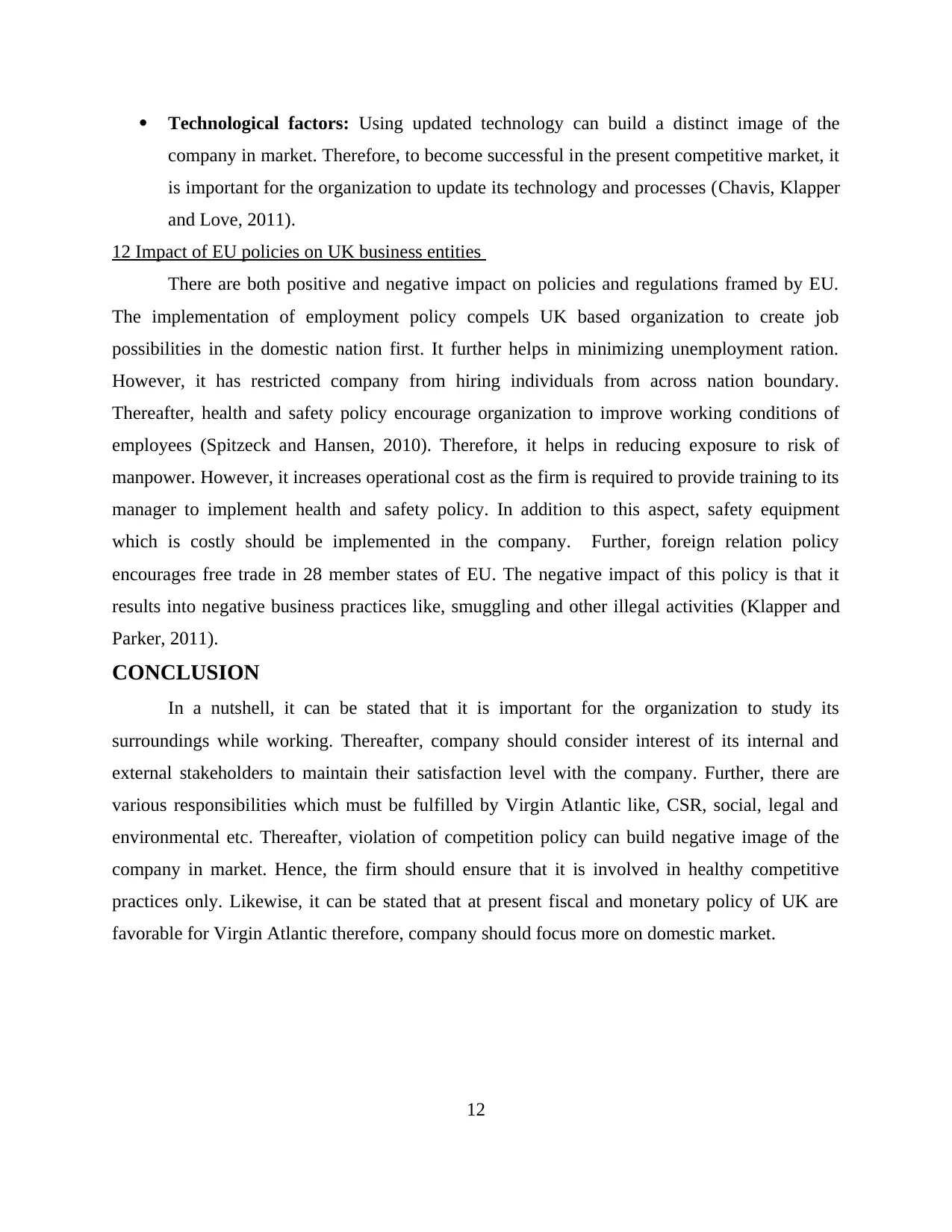
Technological factors: Using updated technology can build a distinct image of the
company in market. Therefore, to become successful in the present competitive market, it
is important for the organization to update its technology and processes (Chavis, Klapper
and Love, 2011).
12 Impact of EU policies on UK business entities
There are both positive and negative impact on policies and regulations framed by EU.
The implementation of employment policy compels UK based organization to create job
possibilities in the domestic nation first. It further helps in minimizing unemployment ration.
However, it has restricted company from hiring individuals from across nation boundary.
Thereafter, health and safety policy encourage organization to improve working conditions of
employees (Spitzeck and Hansen, 2010). Therefore, it helps in reducing exposure to risk of
manpower. However, it increases operational cost as the firm is required to provide training to its
manager to implement health and safety policy. In addition to this aspect, safety equipment
which is costly should be implemented in the company. Further, foreign relation policy
encourages free trade in 28 member states of EU. The negative impact of this policy is that it
results into negative business practices like, smuggling and other illegal activities (Klapper and
Parker, 2011).
CONCLUSION
In a nutshell, it can be stated that it is important for the organization to study its
surroundings while working. Thereafter, company should consider interest of its internal and
external stakeholders to maintain their satisfaction level with the company. Further, there are
various responsibilities which must be fulfilled by Virgin Atlantic like, CSR, social, legal and
environmental etc. Thereafter, violation of competition policy can build negative image of the
company in market. Hence, the firm should ensure that it is involved in healthy competitive
practices only. Likewise, it can be stated that at present fiscal and monetary policy of UK are
favorable for Virgin Atlantic therefore, company should focus more on domestic market.
12
company in market. Therefore, to become successful in the present competitive market, it
is important for the organization to update its technology and processes (Chavis, Klapper
and Love, 2011).
12 Impact of EU policies on UK business entities
There are both positive and negative impact on policies and regulations framed by EU.
The implementation of employment policy compels UK based organization to create job
possibilities in the domestic nation first. It further helps in minimizing unemployment ration.
However, it has restricted company from hiring individuals from across nation boundary.
Thereafter, health and safety policy encourage organization to improve working conditions of
employees (Spitzeck and Hansen, 2010). Therefore, it helps in reducing exposure to risk of
manpower. However, it increases operational cost as the firm is required to provide training to its
manager to implement health and safety policy. In addition to this aspect, safety equipment
which is costly should be implemented in the company. Further, foreign relation policy
encourages free trade in 28 member states of EU. The negative impact of this policy is that it
results into negative business practices like, smuggling and other illegal activities (Klapper and
Parker, 2011).
CONCLUSION
In a nutshell, it can be stated that it is important for the organization to study its
surroundings while working. Thereafter, company should consider interest of its internal and
external stakeholders to maintain their satisfaction level with the company. Further, there are
various responsibilities which must be fulfilled by Virgin Atlantic like, CSR, social, legal and
environmental etc. Thereafter, violation of competition policy can build negative image of the
company in market. Hence, the firm should ensure that it is involved in healthy competitive
practices only. Likewise, it can be stated that at present fiscal and monetary policy of UK are
favorable for Virgin Atlantic therefore, company should focus more on domestic market.
12
⊘ This is a preview!⊘
Do you want full access?
Subscribe today to unlock all pages.

Trusted by 1+ million students worldwide
1 out of 14
Related Documents
Your All-in-One AI-Powered Toolkit for Academic Success.
+13062052269
info@desklib.com
Available 24*7 on WhatsApp / Email
![[object Object]](/_next/static/media/star-bottom.7253800d.svg)
Unlock your academic potential
Copyright © 2020–2026 A2Z Services. All Rights Reserved. Developed and managed by ZUCOL.





